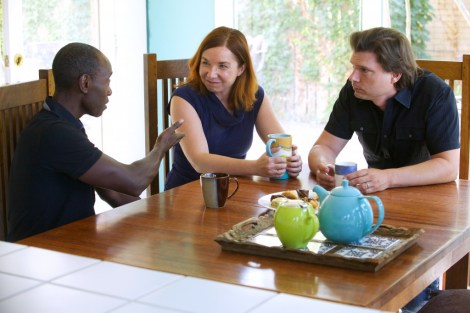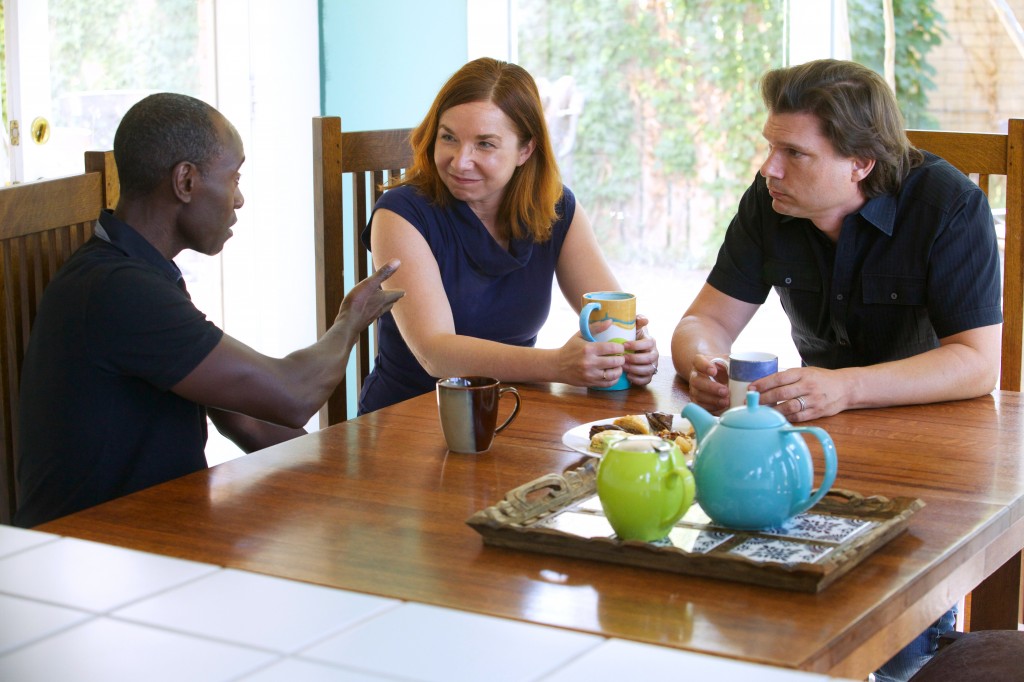
Years of Living DangerouslyCheadle, Hayhoe, and Andrew Farley.
April 13 is the television premiere of the much-anticipated Showtime series on climate change, Years of Living Dangerously. The show features a cast of notable celebrities, who set out with scientists, firefighters and policymakers to explore the front lines of climate change.
The show’s first episode, already available online, features actor Don Cheadle traveling to Plainview, Texas, where he discusses climate change and drought with Texas Tech University climate scientist Katharine Hayhoe and her husband, an evangelical preacher. It also follows Harrison Ford as he travels to Indonesia to look at deforestation and climate change, and New York Times columnist Tom Friedman as he visits Syria to look at climate change and conflict. Matt Damon, Jessica Alba, and America Ferrera appear in later installments of the eight-part miniseries, which premieres at 10 p.m. on Sunday.
The team behind the film is equally impressive, with science advisers and executive producers that include James Cameron, the Hollywood director; Arnold Schwarzenegger, the former California governor; David Gelber and Joel Bach, former 60 Minutes producers; and Dan Abbasi, a cleantech investor whose career has taken him through jobs as an Environmental Protection Agency appointee during the Clinton administration, media strategist at Time Warner, and associate dean of Yale University’s School of Forestry and Environmental Studies.
HuffPost sat down with Abbasi last week to discuss the series and why Years of Living Dangerously producers think Hollywood flair will change the discussion of climate change.
Q. You’ve spent time in government, business, academia, and media. What made you decide to make this your next project? Were you getting frustrated in trying to attack this issue from other directions?
A. Definitely, definitely. I think in some ways the environmental community is very hard on itself in saying, “We haven’t solved this yet.” This is massive. You’re talking about a fundamental turnover of the entire industrial ecosystem of the world. So it is not something you do easily in a couple of decades. And the issue has really been on the big agenda since the 1980s. … In that sense, when you think about how far we’ve come, there’s lots of progress. Even in the red states now there’s polling showing a majority of Americans wanting action on climate change. So that’s all to say, yeah, there is more progress than we’ve given ourselves credit for.
But yeah, I definitely have a frustration that the discourse has been too expert-driven, inside the Beltway, and that we need to give ordinary people a voice and empower them. We have to lead our leaders to do the right thing. The issue is too dangerous at this point to sit by and wait for the leaders. A lot of leaders have abdicated on this. A lot of them have been silent.
The bottom line is that it’s going to take something that looks like a public movement. I have no belief that all of a sudden we’ll have unanimity in the public. None of us is naïve about the idea that you put on a TV show and the whole world comes around, and that’s really not the kind of show it is. But the hope is you’ll break the inhibitions on talking about it, that people will engage more, that they’ll start expressing themselves more, they’ll use some of the tool kits we provide, and mostly that they’ll put pressure on their elected officials to take concerted policy action.
Q. You also wrote a book about Americans and climate change that looked at how to “close the gap” between science and action. Do you think this series can start closing that gap?
A. Yes, I do, because I think emotion is a really big part of this. One of the big things we add to the equation here is emotion. There’s been a lot of cerebral coverage of the issue. I think all of us who are immersed in the issue kind of have this protective layer on, that even we don’t deal daily with the emotional consequence of it. If you did, you’d be all strung out all of the time. If you really understand how serious this is and how strong the inertia is toward this inevitably very tragic outcome for civilization, you have to kind of distance yourself from it.
I’ve been much more emotional about the issue, being involved in the show. When you look someone in the eye who’s lost their family to the Sandy storm, a family that’s in a dire situation or is relatively poor dealing with the aftermath of the storm, you just feel it in your gut. We need to listen to that emotion much more.
Q. As a viewer, I wanted to see more scientists and fewer celebrities. What do you think that having celebrities like Harrison Ford involved brings to the series?
A. This is a genre bender. We’re blending together the storytelling arts with science, and I hope we’ve got that balance right so that we can have the broadest possible audience and have everybody engaged. But to your point, what does Harrison bring? He’s charismatic. He is really intense — in person in our edit room and in the field. I think that intensity is appropriate for this kind of an issue.
I think he brings genuine, authentic indignation and emotion. And because he’s Harrison Ford -– well, you can argue people like that can simulate it and act it, but in this case it’s genuine. He’s a pretty powerful presence in the show and I don’t think most scientists, most scientists, can pull that off.
Q. How did you guys decide on which celebrities to include?
A. We wanted ones who have already done something on the environment in the past, or at least humanitarian issues. Don Cheadle is a U.N. goodwill ambassador. Harrison is vice chair of the board of Conservation International. Matt Damon runs Water.org. So these are people who have an established reputation for connecting to humanitarian issues. The next thing is that they’re all just really, really intelligent. I think the best ones rise for a reason, and part of it is this fierce intelligence that they bring to the study, the craft of acting — understanding the characters and being able to mesmerize audiences by communicating that.
Q. The last major cinematic take on climate change was An Inconvenient Truth. What do you think series will do differently?
A. Well for one thing, former Vice President Al Gore went through one of the most polarizing elections in history in 2000. There was very strong sentiment about him in the South and other places. … I don’t want to pick on Al Gore too much, but we’re not tied to any particular individual. It’s because it is an ensemble cast, and I think there is a better chance to reach bigger audiences. You have evangelical scientists like Katharine. You have Republican governors like Arnold Schwarzenegger. You’ve got Bob Inglis, the former South Carolina congressman who really lost his seat in part because he was tea-partied out for his stance on climate change.
I just think many people across the cultural, political, and ideological spectrum across America will find some voice and some path into the issue here that they might not when it’s Al Gore up there giving what’s still a remarkable film and remarkable accomplishment, a much-needed tutorial about the issue that was vivid and powerful. Nothing in this should take away from the significance of that event, but I do think we’ve gotten to the point where we need a more mainstream vehicle and one that’s not tied to a political angle.
Q. In the climate denial circles, there is the popularity meme they have that, “Oh climate change is just a bunch of Hollywood liberals that care about that.” So is there concern that this is going to be a series of Hollywood liberals?
A. There is. I must tell you we tried really hard both in terms of the subjects and the correspondents to reach across the political spectrum. In some cases we had less luck than we would have liked drawing people from all sides of the political spectrum, because it can be disqualifying in some of ways for people on the right to get involved in a project like this. So, we should acknowledge that there were efforts to broaden it even more than we did, and yet I think we succeed. Republicans have a proud tradition of environmentalism in the past, from Nixon in starting the EPA to George H.W. Bush and the Clean Air Act. I think we do want to both cover the politics, but in the end depoliticize the issue a little bit, which is a little bit of a paradox. You want to show that there are political fights out there, which there are, and you want to cover them because that’s part of the issue in America.
Emotion also has a way of breaking down those ideological filters a little bit as you start connecting as a human being. My hope is that more people will connect as a human being to this, and we will do some good in terms of broadening this. There is nothing you can do besides put out your product and put out the show, talk about it, and hope that people watch and give it a chance.
 This story was produced by The Huffington Post as part of the Climate Desk collaboration.
This story was produced by The Huffington Post as part of the Climate Desk collaboration.



